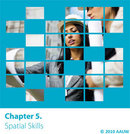


The Importance of Spatial Skills
The topic for "AAUW week" this month is spatial visualization skills.
 One of the most persistent gender gaps in cognitive skills is found in the area of spatial skills, specifically on measures of mental rotation, where researchers consistently find that men outscore women by a medium-to-large margin.
One of the most persistent gender gaps in cognitive skills is found in the area of spatial skills, specifically on measures of mental rotation, where researchers consistently find that men outscore women by a medium-to-large margin.
While no definitive evidence proves that strong spatial abilities are required for achievement in science, technology, engineering, and mathematics (STEM) careers, many people, including science and engineering professors, view them as important for success in fields like engineering and classes like organic chemistry. The National Academy of Sciences states that "spatial thinking is at the heart of many great discoveries in science, that it underpins many of the activities of the modern workforce, and that it pervades the everyday activities of modern life."
Sheryl Sorby, a professor of mechanical engineering and engineering mechanics at Michigan Technological University, has studied the role of spatial-skills training in the retention of female students in engineering since the early 1990s. She finds that individuals can dramatically improve their 3-D spatial visualization skills within a short time with training and that female engineering students with poorly developed spatial skills who receive spatial-visualization training are more likely to stay in engineering than their peers who do not receive training.
For those of you who are scientists or engineers, do you use spatial skills in your work? Do you think well-developed spatial skills are important for scientists and engineers?

Marian,
It's a good question about whether improving spatial skills changes the way we approach problems. I would think it would.
When I worked with CAD, I was designing spacecraft components. Rather than visualizing the design in my head and then drawing it on paper in 2 dimensions, I created the 3-D parts on my computer using CAD and fit parts together in 3 dimensions. I could then rotate the design around very easily, looking at it from all directions whenever I needed to as the design progressively became more and more complex. This meant that I didn't have to constantly visualize the design - instead, I could look at it on my computer screen.
I think CAD has really revolutionized the way that engineers design products and allowed more and more complex designs to be feasible. I also think it has reduced the importance of having good spatial visualization skills for success in engineering design. I still think well-developed spatial skills can be helpful - and I think using CAD helps develop spatial skills - but I think they're even less essential today than in the past.
Christianne,
I am sorry for confusing your name. I see Laura's face, and automatically think of her when I write.
I've never worked with CAD, but am curious about how it acomodates differences.
The post on Sorby's work that indicates spatial skills can be learned interests me. I wonder if improving those skills changes the way we approach problems?
Marian
Marian,
Thanks so much for your comment. As this is AAUW week, I (Christianne Corbett from AAUW) actually wrote this post, and I find your perspective very interesting. I have an engineering degree as well and worked as a mechanical engineer for a number of years and felt essentially the same way as you do. Especially with the pervasiveness of Computer Aided Design (CAD), much of what used to require internal visualization can now be drawn and viewed and rotated on a computer screen. I think that good spatial skills are often useful in engineering but are not essential. I still find Sheryl Sorby's work to be important though for those who think that spatial skills are essential.
Thanks for commenting.
Laura,
I too have heard that spatial skills are important, however, I think that the spatial approach is just one way to skin a cat. Since men developed the field and the teaching approach, it is assumed to be the only correct approach. I don't think that is true.
When working on engineering problems I play to my strengths. I am more likely to take an equation-based mathematical approach than a diagram-based spatial approach; both get to the answer.
While my training is mostly in math, I have engineering degrees and work in applied math. My colleagues are most often engineers and physicists; we do the same type of work so I feel I can speak as an engineer on this subject.
Interestingly enough, when working through AP physics with my children, my daughter and I worked well together -- we both thought things through with equations. The approach was useless with my son -- he and my husband drew each other pictures and moved their hands through the air.
Summary -- yes there are differenences. Are spatial skills critical to being a scientist or engineer? I don't think so.
Marian















